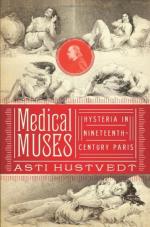|
This section contains 6,686 words (approx. 23 pages at 300 words per page) |

|
SOURCE: "Nineteenth-Century Hysteria: The Medical Context," in Sexing the Mind: Nineteenth-Century Fictions of Hysteria, Cornell University Press, 1995, pp. 25-65.
In the following excerpt, Ender examines the ultimate convergence between differing explanations of hysteria—emotional/moral and physiological—and concludes that femininity is a predisposition for all of them.
Hysteria! Why wouldn't this mystery become the matter and the substance of a literary work, this mystery that the Academy of medicine has not yet solved, and which is expressed in the case of women by the sensation of an ascending and asphyxiating lump (I am only talking about the main symptom) and which translates itself in the case of excitable men into powerlessness and a capacity for excesses of all kinds.
—Baudelaire, L'art romantique
In May 1874 Gustave Flaubert wrote to his friend George Sand: "I am going to get rid of my congestion on the top of a mountain...
|
This section contains 6,686 words (approx. 23 pages at 300 words per page) |

|


